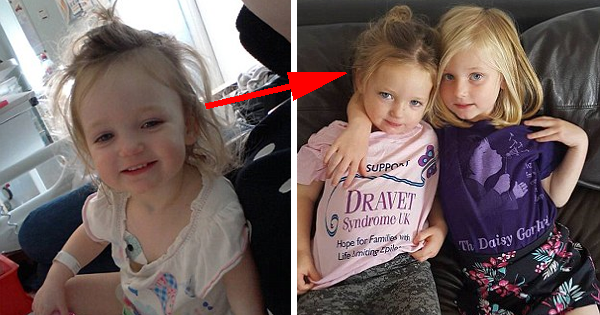Advertisement
When Paige Slocombe was born, her doctors and her parents believed the young girl was perfectly healthy. Her mother, Samantha, had had an uneventful pregnancy without any complications, and Paige’s birth had gone smoothly.
The symptoms only began when Paige was seven months old.
Paige suffered her first seizure during a bath. Her mother, Samantha, “had no idea what was going on. [She]’d never seen a seizure before,” so she “thought [Paige] was dying.”
Samantha and her husband, Michael, rushed their daughter to the hospital, where her doctors believed her to have experienced a febrile seizure, a seizure triggered by higher body temperatures in young children, but not expected to have any serious implications on their health.
Paige was allowed to return home later that day – where she suffered her second seizure. This one was worse than the first, went on for more than an hour, and even cut off her breathing.
Back at the hospital, the doctors had to drill holes into Paige’s shins to administer the proper drugs to stop the seizure and control Paige’s condition.
Samantha feared that her daughter wouldn’t make it through Christmas, “I kept picturing having to ring everyone and tell them she’d gone. It felt like my heart was being ripped out.”
Thankfully, Paige pulled through, and for the next eight weeks, was able to enjoy life as any other young child would.
But then the seizures returned.

Samantha woke one morning with the sudden urge to check on her daughter – who was “limp and lifeless with blue lips and a grey face.” Samantha and her husband worked desperately to resuscitate their daughter and rush her back to the hospital.
That was when Paige’s doctors finally diagnosed her with a more serious form of epilepsy: Dravet Syndrome. This medical condition begins in a child’s DNA, but doctors are still unsure how this condition is passed down. Children who suffer from Dravet Syndrome experience regular seizures, but are able to control their episodes with proper medication and treatment methods.
For Paige and her parents, this means always being on alert and carrying around resuscitation equipment.
Paige’s doctors have also placed her on a ketogenic diet in hopes of reducing her seizure episodes, but the young girls’ Dravet Syndrome has already affected her movement and balance. “Because some of the drugs [Paige]’s on are sedating, it can be like looking after a doll but since starting the diet she’s a lot more alert and stable on her feet,” Samantha said.
She and her husband have since learned how to best care for their daughter and have resuscitated Paige over twenty times following her seizure episodes. They are putting all their efforts into supporting the charity, Jeans for Genes, that brings attention to genetic disorders in children and constantly hoping that Paige will be able to live a more stable life in the future.




